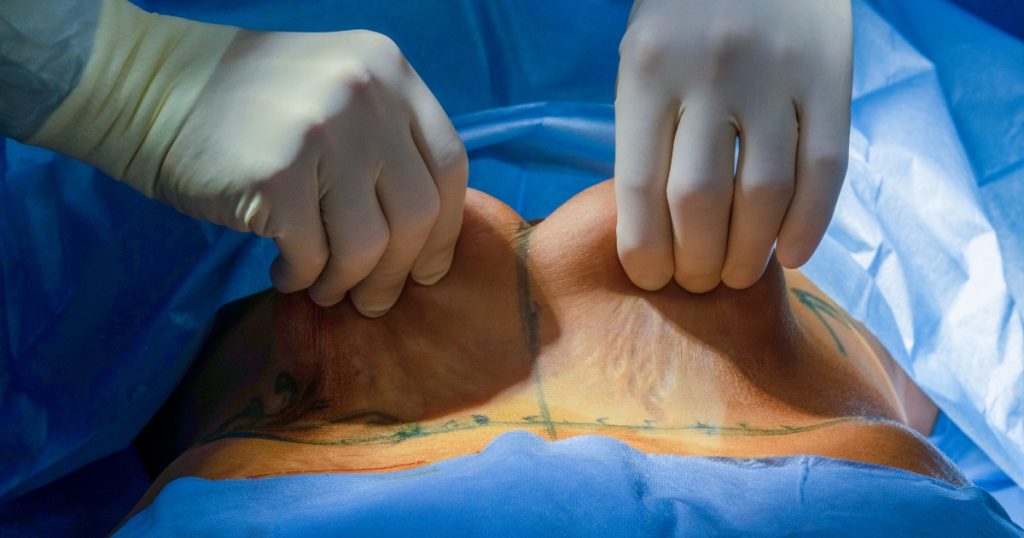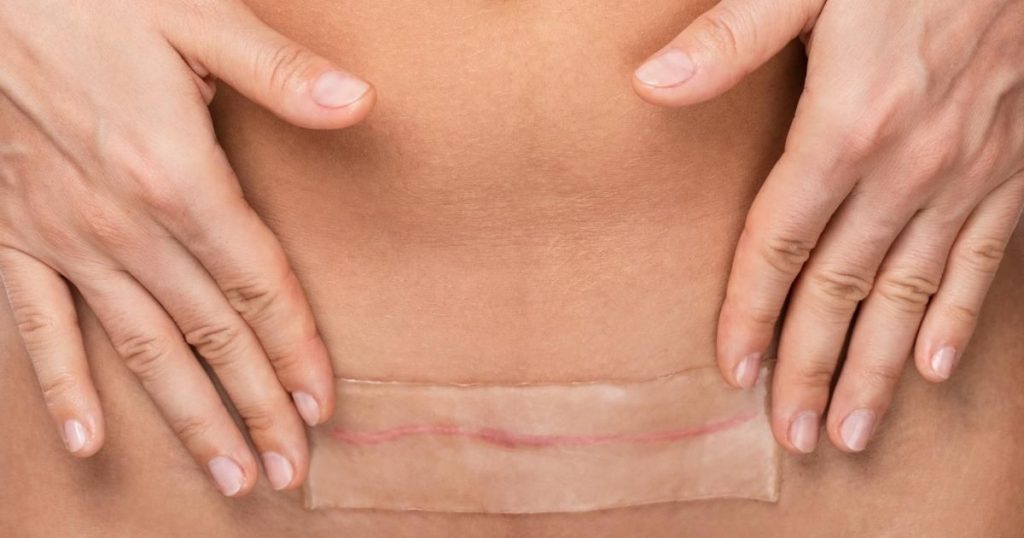If you are considering a tummy tuck after c-section, this comprehensive guide provides all the necessary information. We’ve got you covered, from understanding the procedure to recovery and potential risks. Read on to learn more about the tummy tuck after a C-section.
What is a Tummy Tuck (Abdominoplasty)?
A tummy tuck , medically known as abdominoplasty, is a surgical procedure to remove excess skin and fat from the abdomen and tighten the abdominal muscles, giving a flatter appearance.
Why do People opt for Tummy Tuck After C-Section?
After a C-section, many individuals may experience changes in their abdominal region that are difficult to reverse through diet and exercise alone. A tummy tuck, or abdominoplasty, offers a surgical solution to address these concerns. Here are some reasons why people opt for a tummy tuck following a C-section:
- Skin Laxity : The stretching of the abdominal skin during pregnancy, followed by a C-section, can leave behind excess, sagging skin that doesn’t retract naturally.
- Separated Abdominal Muscles: Pregnancy can lead to diastasis recti, a condition where the abdominal muscles separate. A tummy tuck can tighten and realign these muscles.
- C-Section Scar and Overhang: The scar from a C-section can sometimes be accompanied by an overhanging flap of skin, commonly referred to as the “C-section shelf.” A tummy tuck can reduce or remove this overhang and improve the appearance of the scar.
- Restoring Pre-Pregnancy Contours: Many seek to regain their pre-pregnancy body contours and opt for a tummy tuck to achieve a flatter, more toned abdomen.
Differences Between a C-Section Scar and Tummy Tuck Scar
C-section and tummy tuck scars differ in purpose and location. A C-section scar is the result of a surgical procedure to deliver a baby, while a tummy tuck scar arises from cosmetic surgery to improve the abdominal appearance.
| Feature | C-Section Scar | Tummy Tuck Scar |
| Purpose | Baby delivery | Cosmetic improvement |
| Location | Usually low on the abdomen | Across the lower abdomen |
| Length | Shorter | Longer, hip-to-hip |
Benefits of a Tummy Tuck After a C-Section

A tummy tuck after a C-section offers several benefits, including an enhanced abdominal appearance and increased confidence.
Book A Consultation With Dr Shehzadi Tasneem
Top-rated Plastic Surgeon For Tummy Tuck in Dubai
Installment Plan Available
- Removal of excess skin and fat
- Tightening of the abdominal muscles
- Correction of a protruding belly
- Improvement in the overall body contour
- Reduction in the appearance of stretch marks
Are You a Suitable Candidate for a Tummy Tuck Post C-Section?
Deciding on a tummy tuck post-C-section depends on individual health and desired outcomes. Only some people might be suitable.
- Stable weight for at least 6 months
- No plans for future pregnancies
- Good overall health
- Realistic expectations of surgery outcomes
- Non-smoker or willing to quit
The Procedure: What to Expect During a Tummy Tuck Surgery
Tummy tuck surgery is a detailed procedure requiring skilled surgeons and a few hours of operation.
- An incision made from hip to hip
- Removal of excess skin and fat
- Repair of separated abdominal muscles
- Redraping of the skin and suture
- Placement of drains to remove excess fluid
Recovery Timeline: Post C-Section vs. Post-Tummy Tuck
Recovery after a C-section or tummy tuck varies, with each procedure having its healing process.
| Timeline | Post C-Section | Post-Tummy Tuck |
| First 24 hours | Bed rest, minimal movement | Bed rest, monitoring |
| 1 day | Light activity, pain management | Pain and swelling management |
| 1 week | More mobility, incision care | Check-up, drain removal |
| 1 month | Gradual return to normal | Limited physical activity |
What Are The Problems With Combining A C Section And Tummy Tuck?
Combining these two surgeries can be problematic due to the increased risks.
- Higher chance of complications
- Extended recovery period
- Intensified pain post-surgery
- Potential for reduced milk supply in nursing mothers
- Strain on the body from two surgical procedures
How to Prepare for a Tummy Tuck After C-Section
Preparation is key for a successful post-C-section tummy tuck.
- Consult with a reputable surgeon
- Achieve a stable weight
- Stop smoking several weeks prior
- Arrange for post-surgery help
- Follow pre-surgery dietary and medication guidelines
Maintaining Results: Tips for a Long-Lasting Flat Tummy

Post-surgery maintenance ensures lasting results.
- Engage in regular physical activity
- Maintain a balanced diet
- Wear compression garments as advised
- Avoid significant weight fluctuations
- Stay hydrated and care for your skin
Dietary Guidelines Post C-Section for Tummy Tuck Preparation
After undergoing a C-section, adopting a balanced dietary regimen is crucial, especially for individuals considering a tummy tuck. This ensures successful healing after the tummy tuck and preparation for the subsequent surgery.
- Balanced Macronutrients: Consume an even distribution of proteins, carbohydrates, and fats to aid tissue repair and maintain energy levels.
- High Fibre Intake: Incorporate whole grains, fruits, and vegetables to combat post-surgical constipation.
- Stay Hydrated: Drink ample water and limit caffeinated or sugary beverages to maintain skin elasticity and support digestion.
- Limit Sodium: Reducing salt intake can help prevent water retention and swelling.
- Vitamin-rich foods: Focus on foods rich in vitamins A, C, and E, along with zinc, to promote wound healing and bolster immunity.
- Avoid Processed Foods: Minimise processed and fried food intake to reduce inflammation and enhance overall recovery.
How Long After A C Section Can I Get A Tummy Tuck?
Timing is essential. It’s best to wait until your body fully recovers from the C-section. The Abdominoplasty Necessity Guide helps you understand when you might need a tummy tuck surgery. It’s like a helpful book that tells you if and when you should get this operation.
Tummy tuck swelling reduction means helping your belly get less puffy after surgery by resting and following the doctor’s advice Abdominoplasty procedure stages The doctor marks the areas to be treated and makes cuts to remove extra skin and fat Then the doctor tightens the muscles and closes the cuts with stitches to give a flatter tummy
Stomach surgery soreness After Evaluating tummy tuck involves checking how well the surgery worked and if the patient is happy with the results Doctors look at things like healing scars and overall appearance to see if the tummy tuck was successful
Minimally invasive abdominoplasty is a special tummy tuck surgery that uses smaller cuts to remove extra fat and skin It helps people get a flatter belly with less scarring than traditional methods Tummy tuck aftereffects can include swelling and discomfort in the stomach area Patients may need to take it easy and avoid strenuous activities for several weeks after the surgery
Asymmetrical belly shape means one side of your tummy looks different from the other side This can happen due to various reasons like uneven fat distribution or muscle imbalances
- At least 6-12 months post C-section
- Once abdominal muscles are healed
- After you’ve stopped breastfeeding
- When you’re near your desired weight
- Following your obstetrician’s and surgeon’s advice
Can You Have A Tummy Tuck During A C-Section?
Having a tummy tuck during a C-section isn’t commonly recommended.
- Increased risk of complications
- Strain from two procedures at once
- Potential interference with maternal-infant bonding
- Extended hospital stay
- Might affect future pregnancies
While C-section and tummy tuck surgeries involve abdominal incisions, their recovery timelines and care recommendations differ. Understanding these differences is crucial to ensuring a smooth and safe healing process.
Harness the expertise of Dr. Shehzadi Tasneem Sultan , a renowned plastic surgeon in Dubai, for transformative aesthetic results. With her wealth of knowledge in facial rejuvenation and body contouring, embark on a journey to enhance your natural beauty and self-assurance.
Book a Consultation Now.












